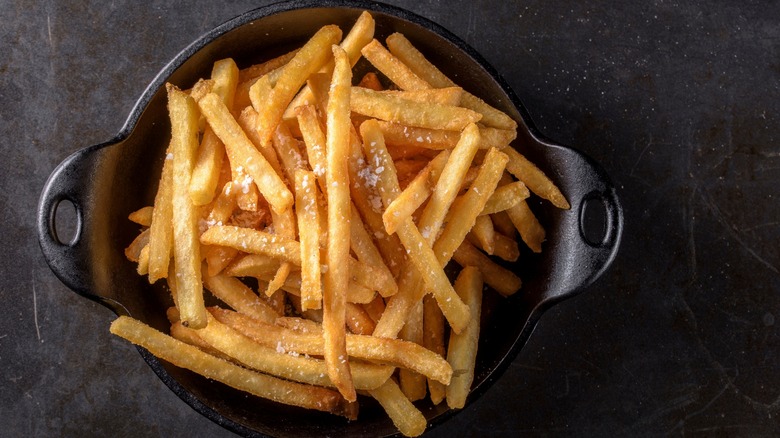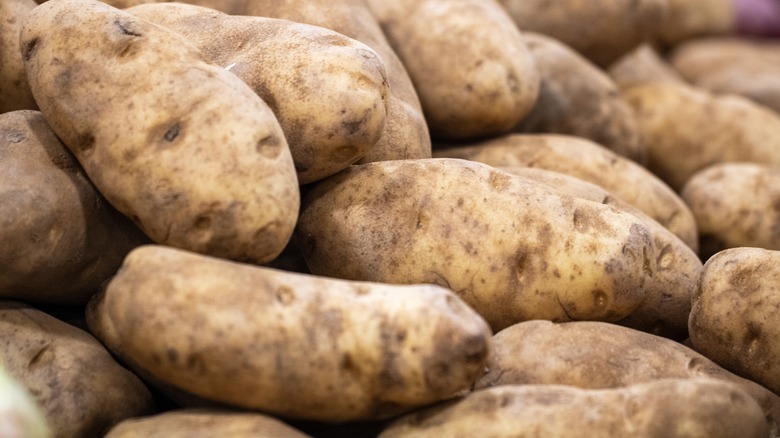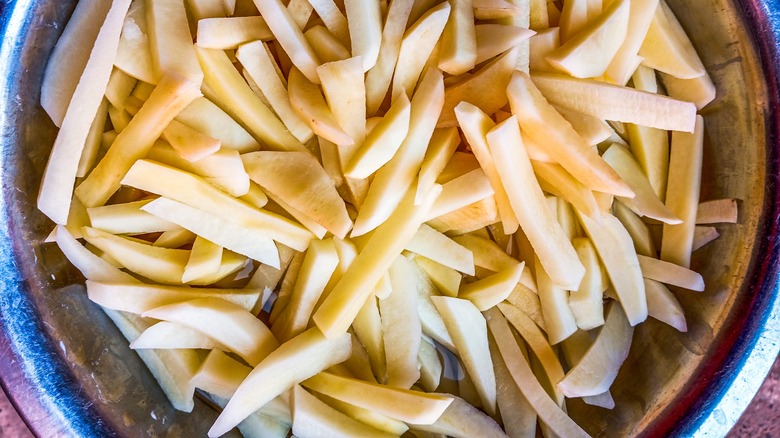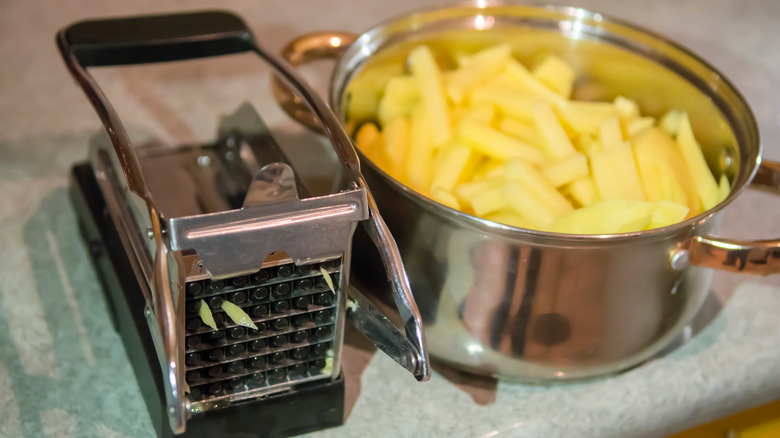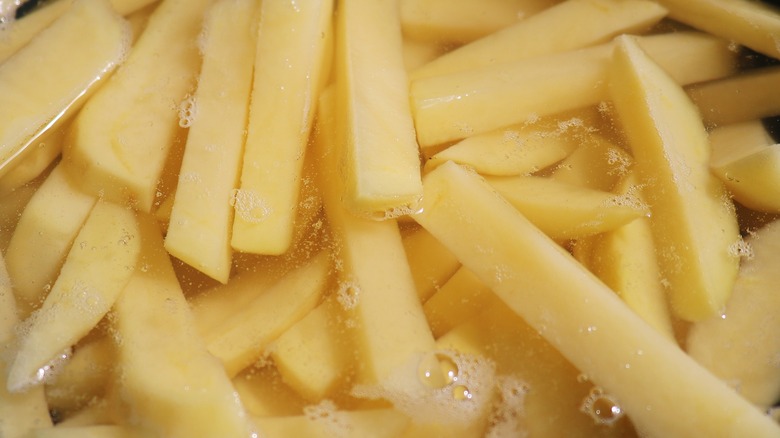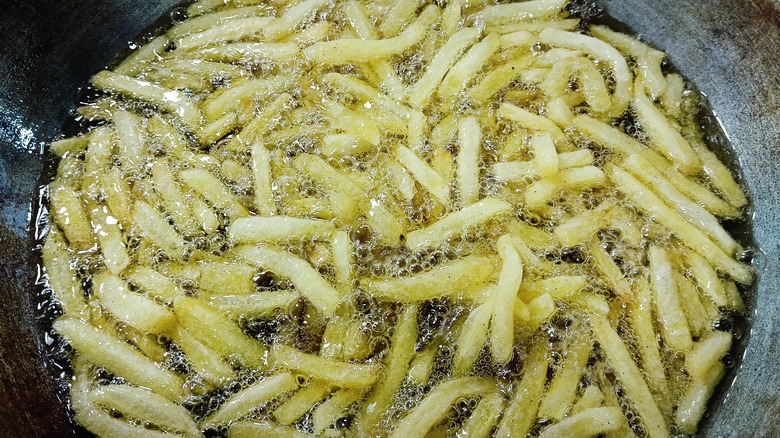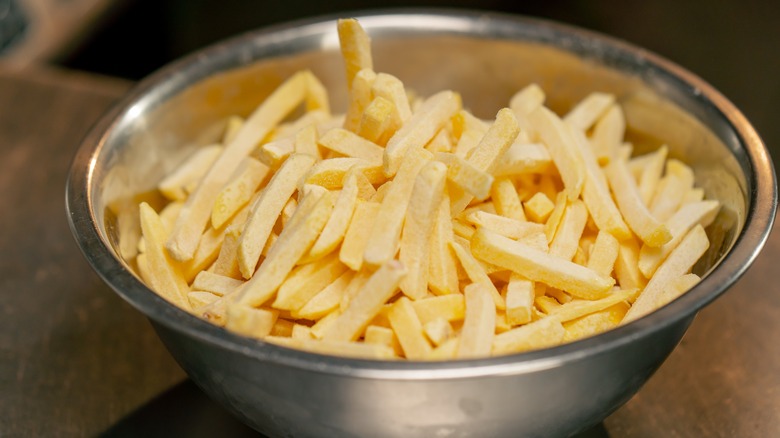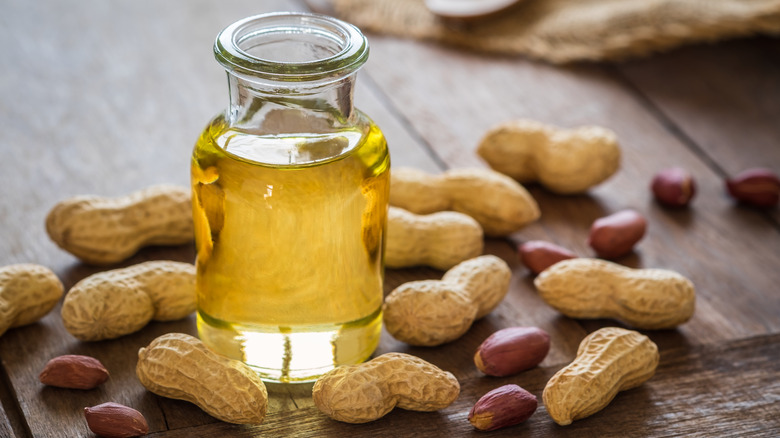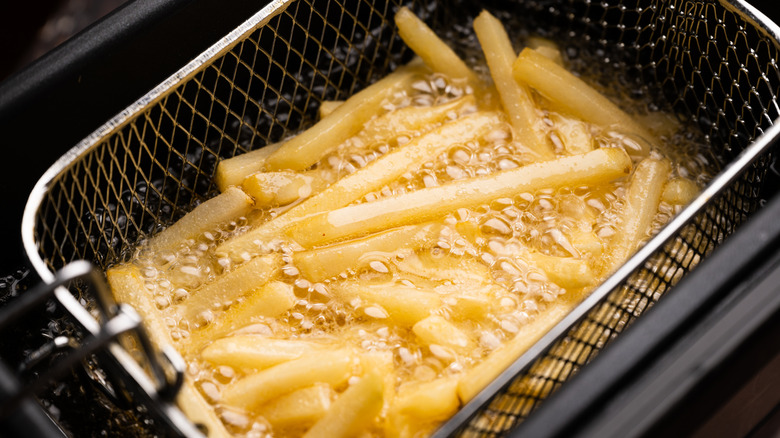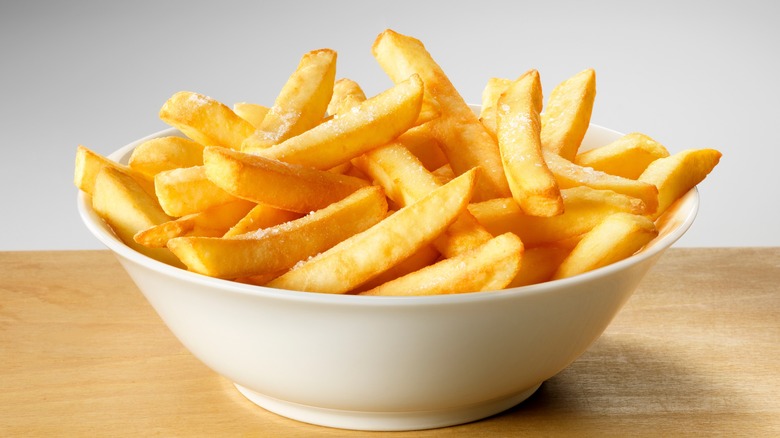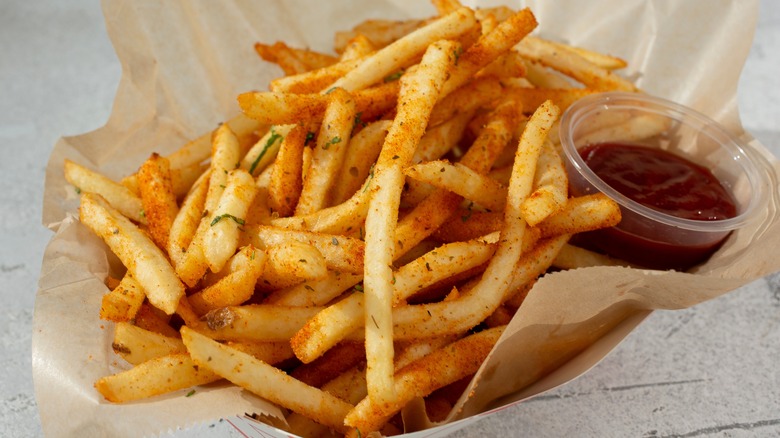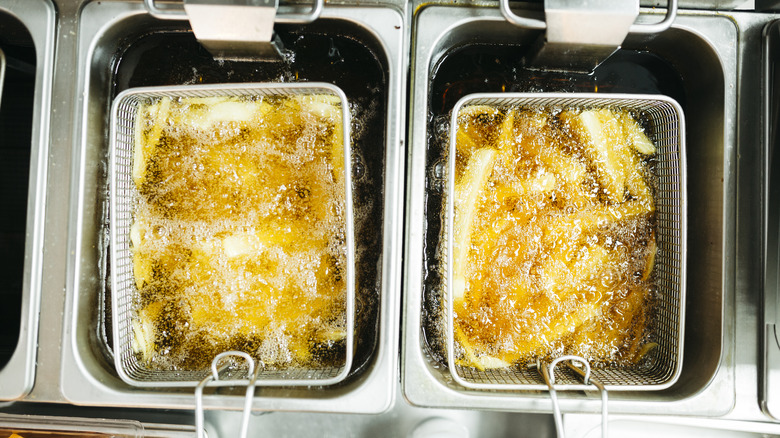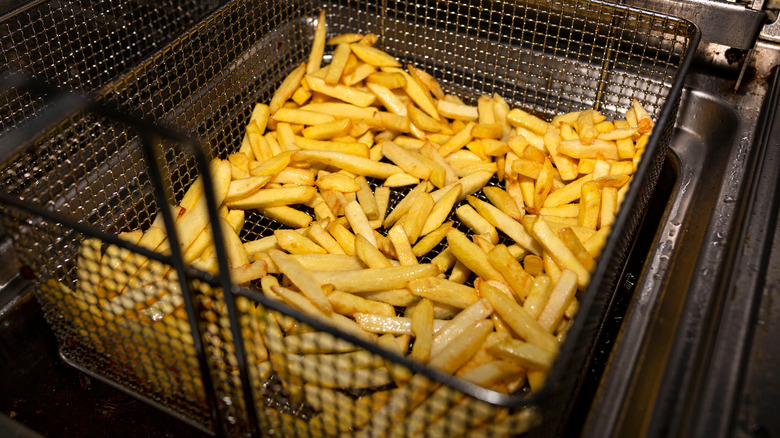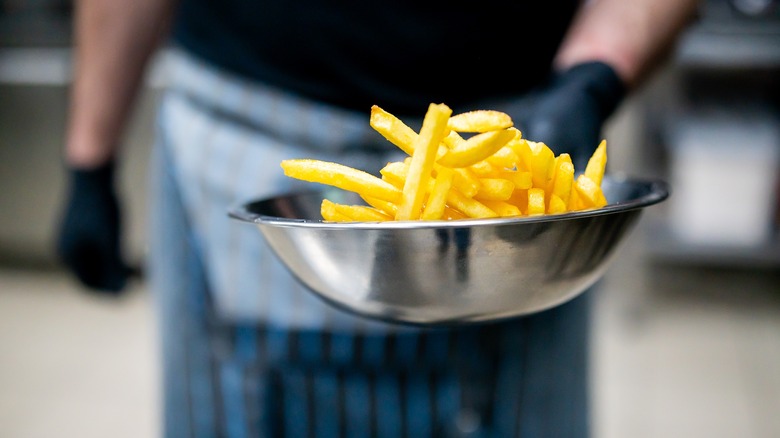Why Restaurant French Fries Always Taste Better Than Homemade
Nailing french fries is way harder than it seems. On the surface, the perfect french fry is little more than a potato cooked in hot oil and sprinkled with salt. However, underneath that surface lurks a complicated, lengthy process of slicing your potatoes perfectly, preparing them carefully, cooking them to perfection, and getting every one of the components just right. It's little wonder that most people who have tried to make homemade french fries have ended up disappointed — and why those same people can't quite figure out exactly how chefs at restaurants make theirs so good.
The truth is that there's no one reason why restaurant french fries taste better than homemade ones, but rather a combination of industry tips and tricks. "I think restaurant fries taste better because we have all of the secrets," says Peaches Ayers, general manager and chef at Denver's Adrift Tiki Bar. Luckily, the days of guarding these secrets are long-gone, and chefs are more than prepared to share their hard-won knowledge. We spoke both with Ayers and Chef James Dibella, currently serving as the Corporate Executive Chef for Duckworth's, Link & Pin, and The Cellar, in the Charlotte area. They laid out exactly why their fries are the top of the pack, and how you can make them just as well in the comfort of your own home.
Restaurants start with the right kind of potato
There are a lot of different potato varieties – more than 4,000 in fact – and it's reasonable to assume that a fair few of them can make a good fry. However, in reality, chefs stick to a few key varieties that have just the right balance of starch and moisture. "Russet potatoes are the kings of french fries. They've got a low starch content and are great for achieving the perfect crispy texture," explains Peaches Ayers. James Dibella agrees, noting that "Idaho russets are high in starch, dense, and low in moisture. These potatoes have thick skins, fluffy flesh, and have the perfect combination of starch and sugar to make crispy fries."
Russets also have the sheer size to produce long-cut fries, giving them that all-important dippable nature. These potatoes are widely available, and so you likely shouldn't have any trouble finding them. However, if your supermarket is out of Russets, Yukon Gold potatoes can be a great second choice. "Yukon Golds have less starch than other potatoes with a creamy texture and buttery flavor. These potatoes will yield a softer, fluffier texture, perfect for frying," says Dibella.
Chefs cut their fries to a consistent thickness
The humble french fry comes in a huge range of thicknesses, from super-skinny shoestring fries to the ultra-chunky ones that are key to a good fish and chips. Generally, though, restaurant chefs stick to a consistent thickness. "I prefer mine to be about a 1/4-inch thick; 3/8-inch is a very standard size for restaurants as well," says Peaches Ayers, a claim that's corroborated by James Dibella. "The ideal thickness for a french fry would be 3/8 inch. These fries will be crispy on the outside and fluffy on the inside," he says. While some chefs chop this approximate thickness by hand to give their fries a rustic appeal, many others use tools to help out.
Having said all this, if you decide to use a different thickness for your potato, it'll still turn out just as good. "I'd say the ideal thickness is subjective," says Ayers. Some people prefer their fries to be a little more pillowy, and going for a thicker cut can help them achieve this. By contrast, if you want a crispier fry that's closer to a potato chip, go for a thinner cut. It's entirely your call, folks.
Restaurants have the best equipment, and the best produce
Here's the deal, guys: It's really hard to make good french fries unless you have the best stuff — and this is something that chefs are keenly aware of. "Restaurants have access to the right equipment and have the ability to order better quality food compared to non-restaurant workers," says James Dibella. Chefs spend years building relationships and knowledge that allows them to discern which items will be best for their outfit, and they're constantly tweaking processes and suppliers to ensure that their food remains top-notch.
That doesn't mean you can't get that same equipment or quality food, of course. It's just that you'll have to spend some time investing in your french fries, if you want to get the best result back. Remember that this investment doesn't just mean buying the right potatoes and oil, either: Everything from your pot to your potato cutter should be keenly considered. "In the industry we use commercial french fry cutters," says Peaches Ayers, an item that Dibella also recommends for its ability to cut even slices. Naturally, though, if you don't have the cash to splash on these kinds of fancy goods, you can make some concessions. For example, Ayers points out that mandolins can be a great stand-in for commercial potato cutters.
Restaurants soak their cut potatoes before frying them
If you're making your fries by slicing them up and throwing them straight into hot oil, you're doing things the wrong way. Restaurants know the importance of giving their fries a bath before they're cooked. "After cutting the potatoes into french fries, we soak the cut fries in cold water for 20 minutes," says James Dibella. Once they've soaked for a spell, he then drains them and repeats the soaking process again.
It doesn't stop there, though. Dibella then drains them once more, submerges them in water again, and then leaves them in his walk-in cooler for a full day. "This process removes the starch from the potatoes, which is critical in the cooking process," he explains. By pulling the starch out of the fries, it ensures that they have a creamier, softer bite once cooked and remain intact instead of breaking apart. Importantly, if you don't have the time, this full soaking process isn't strictly necessary: It's still useful to soak your fries before cooking them, but even doing so for 15 or 20 minutes will make a big difference.
The blanching process is essential
In restaurants, they know the importance of blanching. Blanching vegetables usually involves giving them a quick blast in boiling water before taking them out and shocking them in an ice bath. With fries, they skip the water and go straight to oil. "To blanch our fries we cook them in the fryer at a lower temperature to ensure the potatoes are cooked through," explains Peaches Ayer. "If we throw the fries in immediately without blanching them, the outside of the fries will cook faster than the inside."
This more even cooking process ensures that your fries remain soft inside, while helping them crisp up on their exterior, says Ayers. Blanching has a few other advantages, too. "Blanching will prevent oxidation/browning due to the deactivation of enzymes," says James Dibella. Dibella also points out that when you blanch your fries, it can prevent them from absorbing too much oil, turning greasy and bogged-down. Aiming for a temperature of around 260 degrees F to blanch your french fries is a good benchmark. If you're not using a countertop deep fryer, grab yourself a clip-on deep-fry thermometer to ensure that your pot of oil doesn't get too hot.
After blanching, restaurants freeze their fries
Making restaurant-quality french fries is an exercise in extremes — when it comes to temperature, that is. After restaurant chefs blanch their french fries in hot oil, they then frequently pop them in the walk-in refrigerator for a while. "We always cool our blanched fries to below 41 degrees F before bringing them up for service," explains James Dibella. The fries are generally left in the fridge for roughly an hour, but they can be kept in there for up to a day.
Cooling fries after blanching isn't just a great way to free up space in the kitchen while the chefs work on other things. Doing this initiates a process called "retrogratiation," in which the potato's cells solidify and firm up. This prevents the fries from taking on excess moisture, and means that when they're fried in the hot oil they get crispy, instead of absorbing the oil and becoming wet and greasy. It's important to allow the fries to cool and release all their steam before they're put in the refrigerator, both so they don't have any excess moisture on their surface and so they don't create condensation in the cold environment.
Restaurant chefs use specific types of oil
Oils are all made slightly differently, and to make excellent french fries you need the right one. The ideal oil is one that doesn't impart much flavor onto the fries and remains stable at high heats. Luckily, there are a few to choose from. "My preference is high oleic sunflower oil," says Peaches Ayers. "It contains healthy fats rather than trans fats, is great for high-temperature cooking, and is a great choice for avoiding allergens like peanut or soy based oils."
James Dibella opts for a different oil that has similar traits. "We prefer to use peanut oil for frying. This oil has a high smoke point, neutral taste, and ability to help food develop a creamy texture," says Dibella. "Peanut oil can withstand temperatures of 450 degrees [F] without burning. This oil does not absorb the flavors of the food it is cooking." The high temperatures that both peanut and sunflower oil can withstand are important as when oil starts to burn, it imparts a bitter, charred flavor onto the fries — even when they're submerged in it. Peanut oil's lack of absorbency of flavors also means that you can use it several times before changing it, without having to worry about it tasting too potato-y.
In restaurants, they often double fry their fries
Have you ever wanted the secret to an ultra-crispy french fry? It could be as simple as frying it twice. Double frying french fries is common practice in restaurants. After the fries have had their first sizzle in hot oil, they're then cooked again at a slightly higher temperature, creating a huge amount of flavor and an improved texture. For James Dibella, it's an essential step. "Double frying french fries is absolutely necessary," Dibella says, who then goes a little further into the science behind why twice-fried french fries are better. "This helps with the evaporation process and reduces the moisture level and starch content. The first fry on the french fries softens the food, and the second fry crisps it up. This process helps achieve the perfect crispy french fry."
However, while double frying can take you to french fry heaven, not every chef does it. "If the french fries were blanched properly a second fry is unnecessary," says Peaches Ayers. As blanching your potatoes kickstarts the cooking process, they'll still benefit from the moisture and starch reduction that double frying them provides. At the end of the day, Ayers says that it comes down to the texture you prefer, saying, "If you like your fries extra crispy there's no harm in double frying!"
Chef-made fries are usually cooked in small batches
When it comes to eating french fries, it really is a case of the more the merrier. However, when it comes to cooking them, restaurant chefs can be pretty restrained and resist the temptation to put too many fries in the basket. "When blanching/frying, never overfill the fryer baskets with too much product," says James Dibella. "This can cause the fries to cook unevenly and bring the temperature of the fryer down."
This really comes down to simple science: If you're putting colder french fries into hot oil, the more you put in, the lower its temperature will become. If your fryer basket is clogged up with french fries, it also prevents the oil from circulating and working around each fry properly, and you'll end up with chalky chunks of potato. While how many fries you can cook will depend on the size of your fryer basket or pot, it's best to work with one or two portions at a time, serving them as soon as you can after they're cooked.
Restaurant fries are expertly seasoned
You can cook a french fry to perfection, but unless you've seasoned it properly it'll never live up to its potential. Seasoning french fries is essential to bring out the flavor of the potato and the oil, and create additional layers in this simple, yet effective dish. Restaurants take their seasoning seriously, however simple their blends are. "We season our french fries with kosher salt and freshly cracked black pepper," says James Dibella. "We prepare this seasoning ahead of time and it is a 50/50 blend of salt and black pepper."
Seasoning can improve the most mediocre french fries, and keeping things simple allows them to remain versatile, while being delicious in their own right. However, going for stronger-flavored seasonings turns your fries into more of an event. "Every restaurant typically has their own preference. Coarse salt alone is simple enough for great tasting fries, it can be fun to switch things up and use seasoned salt or garlic salt too," states Peaches Ayers. Ayers also points out the importance of seasoning fries while they're still hot; doing this helps your seasonings stick to the potatoes properly, and not just drop to the bottom of the bowl.
It's important to keep an eye on the temperature
French fries may be made using a few different parts — potatoes, oil, and seasonings — but it's important that each of those parts is perfectly calibrated. When it comes to your oil, it's not just vital to pick the right kind, but to watch its temperature like a hawk. "Make sure to check your temperature gauge on the fryer," says James Dibella. "If the oil is too cool, the fries will absorb too much oil and turn out soggy." If you don't have an at-home fryer, getting a thermometer for your pot is essential.
The reason this is all so important is because the ideal temperature to cook french fries in is actually pretty specific. You'll generally want your oil to be somewhere between 350 to 375 degrees F for the final fry. If you're double-cooking your french fries, the first cook should be performed at around 325 degrees F. Going even a little below or above those temperatures will result in disaster. As Dibella says, oil that's too cold will make your fries soggy, while oil that's too hot will burn them.
Chefs take measures to prevent their fries from being greasy
It's natural for french fries to be a little greasy — unless you're baking them or cooking them in the air fryer, you have to submerge them in hot oil to cook them. However, restaurant chefs are pretty careful to get rid of as much oil as possible before the fries reach your table. "It's important to let them drip off the excess oil after pulling them out of the fryer," says Peaches Ayers. "I give mine a good shake and let them rest for about 30-45 seconds before transferring to a bowl to be seasoned."
If you just dump your fries straight into a bowl without letting them drain, you take all of the hot oil from the fryer with them. As they sit and cool, they'll then soak up all of the oil they're sitting in, with the ones at the bottom of the bowl getting especially soggy. If you're cooking your fries in a deep fryer at home, you can simply let them sit in the basket after taking them out: The oil will drip straight back into the fryer. If you're cooking them in a pot, using a spider strainer to retrieve them will help drain the oil right off.
Restaurant chefs have expertise in this simple-looking dish
One of the main reasons why restaurant french fries are better than the ones you make at home is frustratingly simple: The people who make them do it every day. "Chefs and cooks that work in restaurants have been schooled and trained to perfect their craft," explains James Dibella. "Almost every chef/cook makes French fries on a daily basis which in turn will yield a better tasting and looking product."
It's worth remembering that people don't just become chefs overnight. The average culinary school course takes between two to four years, during which students are taught in classes and gain practical skill with placements and internships. From there, folks become line cooks, before eventually becoming station and sous chefs, and finally executive chefs. During all this time, they're learning the tricks of the trade and making dishes like french fries time and time again, tweaking and refining their process every time they do so. Importantly, this doesn't mean that you can't achieve a similarly excellent result with your french fries. It's true what they say, though: Practice makes perfect.
